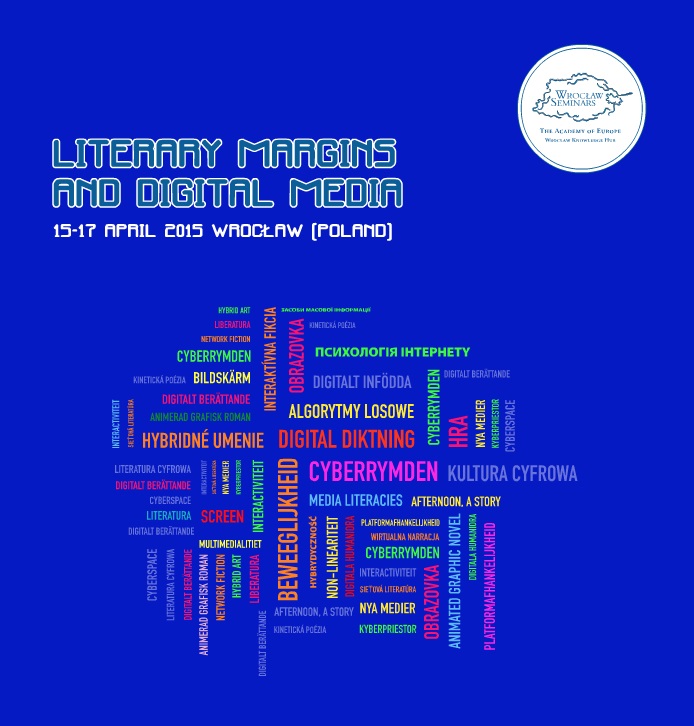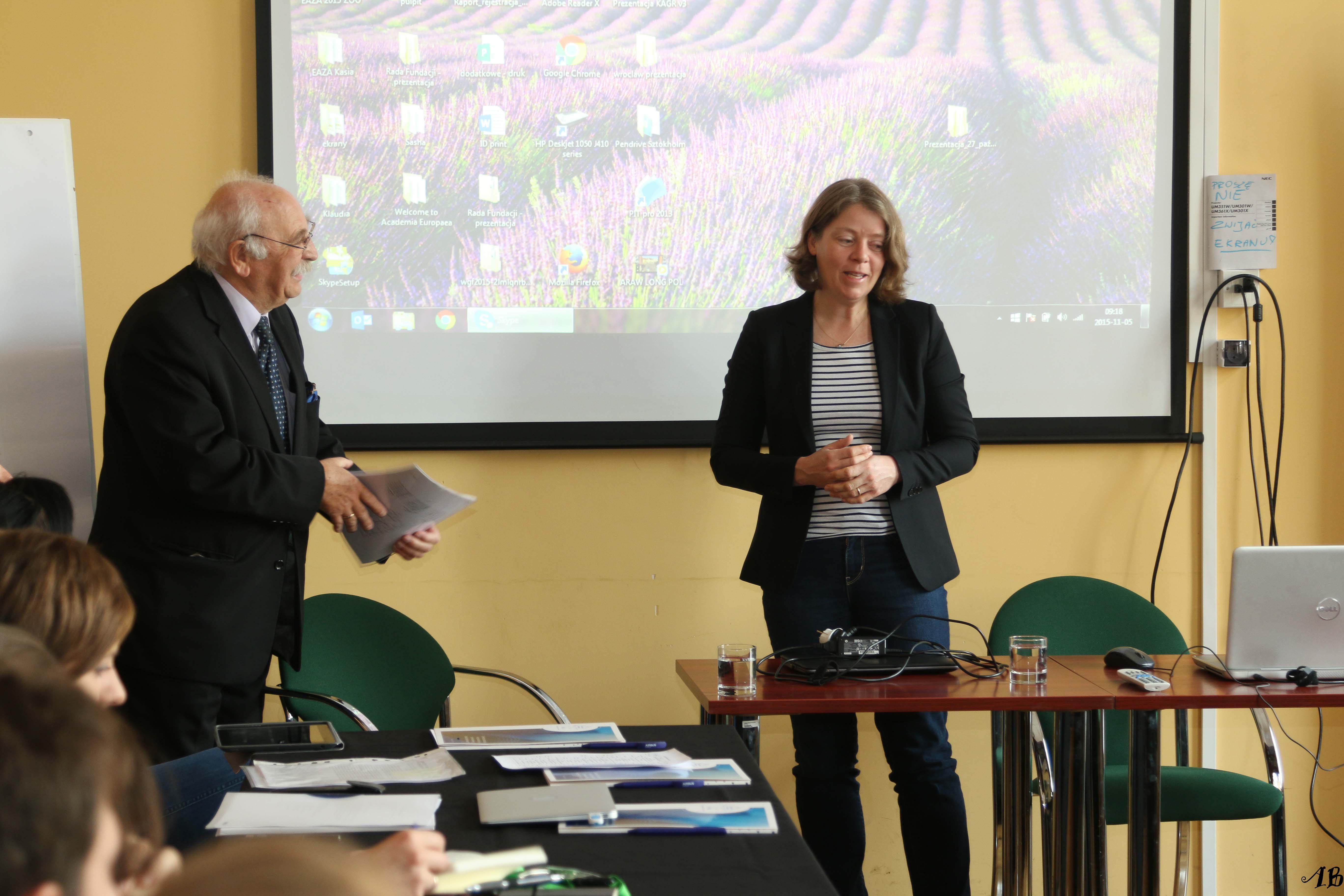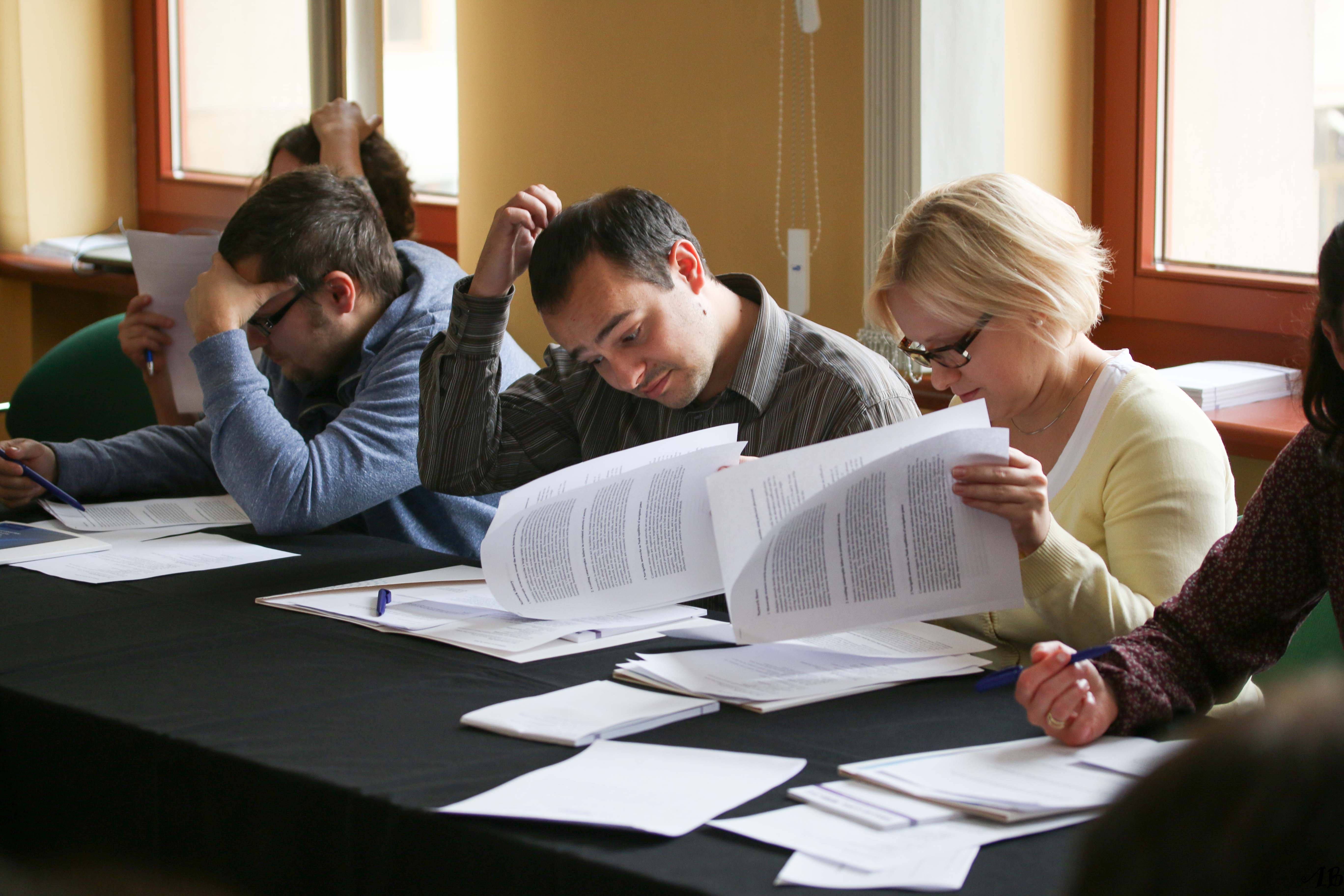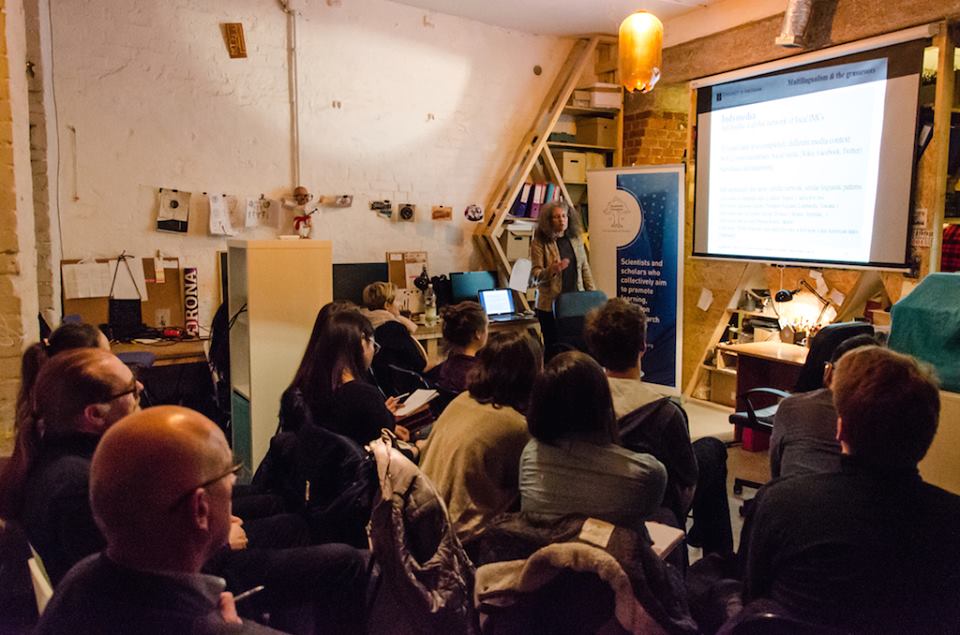The Wrocław Hub has now been fully active for over four years, with a full time staff and a few students from the University of Wrocław as interns. 2015 was another very busy year for the Hub. In 2015 we arranged a number of wide scope high quality international activities. These included organization of the seminar within The Wrocław Seminars project: Literary Margins and Digital Media. Also, we officially launched a series of workshops on academic writing The Excellent Science Days and co-organized smaller events like visiting lectures and summer schools.
Regional AE Members Meeting#
On March 19, the Regional AE Members Meeting was held in Wrocław. The event brought together approximately 40 scholars: local and regional AE Members as well as local academic community. The aim of the meeting was to discuss the future of Academia Europaea and its further activities. The main point of the agenda was the official signing of an agreement between the city of Wrocław, represented by the Vice President Adam Grehl, and Academia Europaea, represented by the President of AE, Sierd Cloetingh.The Wrocław Seminars Project#
The Wrocław Seminars is an initiative of Academia Europaea, University of Wrocław and Riksbankens Jubileumsfond, appointed as a three-year project including three international seminars. The project is mainly addresses young researchers (before the doctoral defence or right after it) from Central and Eastern Europe. AE Board wants to transform this initiative into a multi annual programme aiming at the development of scientific and research bridges between Western Europe and Central and Eastern Europe.The second seminar, Literary Margins and Digital Media (April 15-17, 2015), was devoted to cultural shifts caused by digital media. The traditional high culture is becoming increasingly marginalized, while forms of cultural expression which were seen as marginal, or which were located at the periphery of the cultural field, have been gaining a more prominent place. One could think in this context both about such popular genres as crime fiction, chick lit, or science fiction and how they have been influenced by digital media, and about the explicit digital developments such as hypertext, digital poetry, fan fiction, weblogs, games and other digital forms of storytelling.
The programme consisted of 7 keynote lectures and 8 young scholars sessions. The presentations of the first day concentrated on reading in the digital culture. The focus of the second day was on the recent developments in childrens literature, while the third day was devoted to games and authorship in the digital era.
There were also two special parts of the seminar:
- the literary meeting with Michael Joyce, Zuzana Husárová and L’ubomir Panak in the Wrocław Contemporary Museum. Michael Joyce and Zuzana Husárová are not only scholars, but also successful authors of different generations, different cultures and aesthetics, and yet there is a strong common trait in the works of both of them: they are based on revealing the archetypes of literary communication in a hybrid, post-medial landscape of genres and communicative roles. The meeting with Michael Joyce and Zuzana Husárová was an attempt to outline the history of relations between literature and new media, to ask questions about the future, and to define „marginality” and the very position between the centre and its surroundings. The digital performance of Zuzana Husárová and Lubomir Panak enabled the participants to have a live experience of digital art,
- the New Media in Children's Literature Studies: Reflections and Insights panel with Board members of the International Research Society for Children’s Literature. The panel consisted of five presentations by renowned children`s literature scholars from the UK, The Netherlands, Taiwan, and Canada. The participants discussed the increasing importance of digital contexts in their own research at the same time as they all acknowledged the abiding high status of the traditional book as a text and an object.
A significant conclusion reached by the panellists was the necessity of focusing on real young readers and audiences as it is the young generation that is being especially affected by the rapidly developing digital environment. Both the panellists` presentations and the discussion afterwards proved to be a substantial contribution to the overall conference debate on the concept of digital media.
While the publication of the conference proceedings of the Seminar Literary Margins and Digital Media is the final task of the organising committee, the preparations for the third Wrocław Seminar have just started. The organising committee for the conference on Central Europe and Colonialism: Migrations, Knowledges, Perspectives, Commodities have met on December 12, 2014 for the first time.
Central Europe has not yet been an object of keener interest in (post)colonial studies. However, not only did large numbers of Central Europeans migrate to the (former) colonial world, but also provided personnel to occupy, administer and police colonial empires, and reflected on colonial experiences at the levels of high and popular culture. Even if largely excluded from colonial politics at an international level, Central Europeans played an important role in generating new discourses based on data gathered in the colonial contact zone.
The conference will cover three themes:
- migration from Central Europe to the colonies,
- the genesis of scientific and scholarly discourses that developed in Central Europe in relationship to the colonial world,
- the application of insights from (post)colonial studies to the study of history and culture of Central Europe.
The committee consists of Pieter Emmer (Leiden), Siegfried Huigen (Wrocław), Michael North (Greifswald), Renate Pieper (Graz), Dorota Praszałowicz (Kraków) and Dorota Kołodziejczyk (Wrocław). The conference is planned for September 21-23, 2016 and will be a part of The European Capital of Culture Wrocław 2016.
The Excellent Science Days#
This two-day workshop is a completely new initiative of the Hub. The idea of organizing such meeting emerged after Professor Kondorosi`s letter on unsuccessful attempts in getting ERC grants in „new” Europe. The major objective of The Excellent Science Days (November 5-6, 2015) was to promote excellence across Europe, through strengthening the potential of young researchers from Central and Eastern Europe to become scientific competitors within European Research and Cooperation Programmes (i.e. ERC, COST, FET, Marie Curie), and enhance their capability to successfully submit the research manuscripts to top level journals in natural sciences. The event comprised two parts:- open event - on EU research grant possibilities, such as ERC, COST, Marie-Curie and FET Open
- workshop dedicated to "good scientific writing” provided by the editors of Nature, Liesbeth Venema and Pep Pamies
The co-organizers, Young Academy of Europe, Academy of Young Scholars and Artists, Wrocław Research Center EIT+ and Wrocław Academic Hub expressed their will to organize a round 2.0 in 2016.
Visiting Lectures & Summer Schools#
As in previous years, the Wrocław Hub arranged a series of lectures for local academic community. The purpose of these meetings is to bring distinguished researchers to Wrocław in order to enhance the quality of higher education and supplement various faculties of the universities.The first visiting lecture was held at Faculty of Electrical Engineering of the Wrocław University of Technology, and was delivered by Professor Einar Hope (Bergen) on power market reforms taking place in Norway and on Nordic market. During the lecture Professor Hope also referred to ongoing developments towards European market expansion and integration.
The second lecture was organized in cooperation with Regional Office for Internation Debate, Academy of Young Scholars and Artists and Panato Cafe. Professor Virginie Mamaoduh (Amsterdam) focused her lecture Globalizing the city and the grassroots: Political geographies of urban movements and linguistic diversity on the impact of European integration on national languages and the languages of social demonstrations.
Last, but not least, Academia Europaea Wrocław Knowledge Hub supported other events, such as summer schools, student conferences and Hubert Curien Fund initiatives:
- Summer School Nationalism and Populism as Challenges for European Unity,
- The Cooperation Forum Poland – Romania - The Republic of Moldova,
- IX International Student Conference Politics & Society in Central and Eastern Europe
 ,
,
- Language Endangerment and Revitalization - Poznań Linguistic Meeting 2015, organized by Professor K. Dziubalska-Kołaczyk,
- Ion Channels Trimming the Brain, organized by Professor A. Verkhratsky,
- Flexible Query Answering Systems (FQAS) 2015, organized by Professor J. Kacprzyk,
- 200 years of the Cracow Learned Society organized by Professor J. Kozłowski and the Polish Academy of Arts and Science.
Students internships#
Thanks to the bilateral agreement signed between Academia Europaea and the University of Wrocław, the Wrocław Hub is open for students. In 2015 three students were pursuing their traineeships at AE Office: Anna Konarska (MA Student from the Faculty of English, University of Wrocław), Karolina Kulik (MA Student from the Faculty of English, University of Wrocław) and Joanna Mikisz (BA Student from the Faculty of English, University of Wrocław).The basic duties of the interns were, among other things: getting to know the structure and operations within the AE, editing the AE website (text structure, text selection, editing, formatting) and working with Wiki syntax, helping co-organizing lectures and conferences, translation, verification, writing and proofreading of documents and texts.
Daily work:#
- Support of Graz Information Centre (content management, updating profiles),
- Support of Nomination Process (preparing and sending welcome packs, institutional letters),
- Support of Hubert Curien Initiative Fund,
- Administrative support for Class A1 and Class A2,
- Internships for students,
- Production of promotional materials (leaflets, directories, folders, brochures, certificates, pendrives etc.),
- Preparation of the corporate branding and coherent brand book of the Academia Europaea (logos, letterheads, email footers, business cards, .ppt presentation templates).







